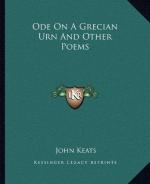|
This section contains 2,362 words (approx. 6 pages at 400 words per page) |

|
In this essay, Shokoff offers his views on understanding Keats's" Ode on a Grecian Urn".
Interpreting the beauty-truth identification in Keats's "Ode on a Grecian Urn" has become virtually an industry unto itself in the past century and a half; yet, with all of the sensitive, brilliant, and sometimes ingeniously inventive readings the poem has received, the equation that has been its most attractive problem remains an unresolved mystery. Some have seen the closing epigram as an artistic blemish in an otherwise masterful poem; others have modified that stand by calling the last lines a "brilliant failure" that is a statement of faith in an ideal, made against persistent doubts from the real world. More recently, critics have tended to agree that the identification is not a weakness of the poem, but have differed in explaining its significance. Is the poem ultimately a poetic expression of Keats's...
|
This section contains 2,362 words (approx. 6 pages at 400 words per page) |

|




